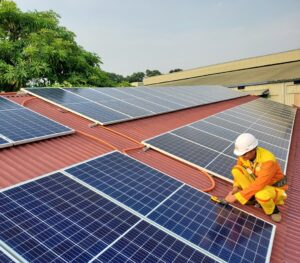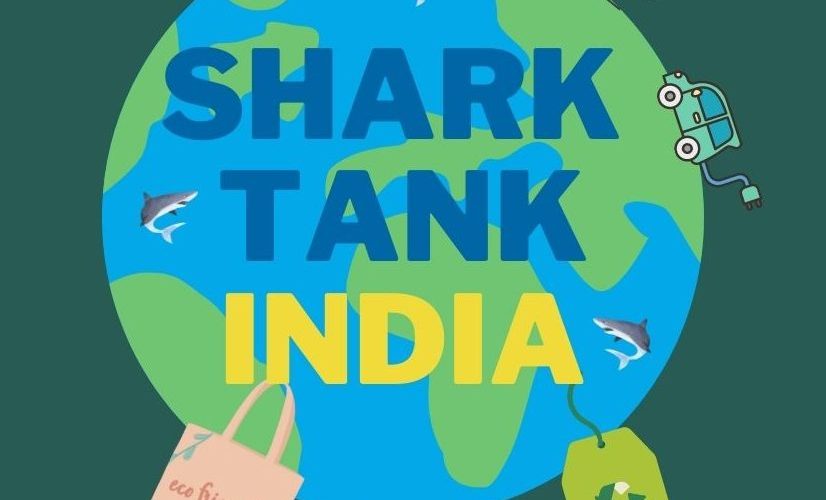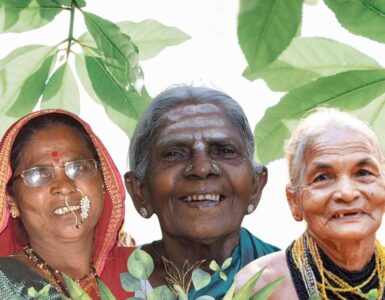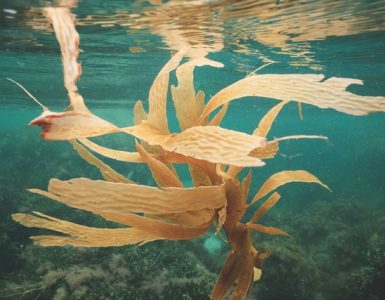As the curtains drew on Shark Tank India Season 4 last month, it is time we look at environmental startups that appeared on the show.
The fourth season of Shark Tank India started streaming on 6 January 2025, featuring 52 episodes with 156 companies making their pitches.
With close Rs 1000 million (Rs 100 cr) investments in 92 (almost 59%) promising startups, this season again brought many fresh ideas and groundbreaking innovations.
As we have seen every season, many climate startups are also making themselves heard on national television, grabbing investments, and most importantly, demonstrating solutions for the environmental problems.
Similar to Season 3, Shark Tank India Season 4 had a special ‘Ecopreneur’ episode, featuring three environmental startups, two of which got investments from the sharks.
Apart from the Ecopreneur episode, more than a dozen other startups solving waste, deforestation, and carbon emissions problems appeared on the show. While many of them did not get investments, they helped raise awareness on important environmental issues.
Here are the green startups from Shark Tank India Season 4 that put sustainability and the environment at the forefront.
Woolah Tea
Founder: Upamanyu Borkakoty
While many of us are fond of having green tea by dipping the teabags in hot water, we seldom realise that this action releases microplastic particles in the beverage, subsequently into our bodies.
According to a study, steeping a plastic teabag at 95 degrees Celsius releases around 11.6 billion microplastics and 3.1 billion plastic nanoparticles into the water.
Woolah Tea solves the problem by selling whole leaf teas compressed using patented technology. The Assam-based company makes bagless tea dip, offering a plastic-free tea experience without the fear of microplastics released by a teabag.
The compressed tea leaves are attached to a cotton string, which can be brewed like a normal tea bag, up to 2-3 times. The tea leaves are organically grown and sourced from small-scale organic tea brewers.
Upamanyu, who hails from Sivasagar in Assam, mentioned that Woolah means happiness in Assamese.
The company has reported revenue of Rs 5.8 million in FY21-22, Rs 9.5 million in FY22-23, Rs 20 million in FY23-24, and Rs 13 million in FY24-25 (till September 2024).
Upamanyu asked for Rs 5 million for 1.66% equity for Rs 300 million valuation, he secured the deal from Aman Gupta, 5 million for 2.5% equity plus 2.5% advisory equity for Rs 200 million valuation.
Bhavisya Plast
Founder: Pallavi Luharuka
Pallavi started the pitch with startling statistics about how plastics have infringed on human lives. The average Indian consumer consumes almost 700 kg of plastic by the age of 60.
The staggering quantity of plastic consumption is not only damaging health, but it is a huge detriment to the environment. Research has revealed that an estimated 710 million metric tons of plastic will pollute the environment by 2040, contributing up to 19% of global greenhouse gas emissions.
Though biodegradable plastic alternatives exist in the market, they are expensive due to the raw materials (like corn starch) and processing technology involved. In addition, corn-based plastic has limited use cases, like single-use bags or kitchenware items.
RBG’s BhavisyaPlast is a green-tech company that makes environmentally friendly plastic alternatives from agricultural waste like broken rice.
Kolkata-based BhavisyaPlast has made different variants of bioplastic using patented technology that are heat—and water-resistant. These materials offer several potential applications, such as heavy-duty bags, car seats, cable and electronics, etc.
Further, Pallavi mentioned that BhavisyaPlast’s material naturally decomposes in soil and water in less than 90 days.
Apart from bioplastic, BhavisyaPlast also manufactures eco-friendly lubricants using vegetable oils, which the company sells to automobile companies.
Pallavi had come to the show with an ask of Rs 5 million investment for 1.5% equity (Rs 333.3 million valuation), she got Rs 20 million for 10% equity from Aman, Anupam, Chirag and Namita (valuation Rs 200 million).
Rescript Sustainable Stationery
Founders: Ashutosh Ananth and Naren Raj C S
Even though digitalisation is increasing, paper consumption in India has increased by almost 8% in FY23- 24.
To cater to high paper production demand, thousands of trees are cut down daily. Additionally, pulp and paper is a relatively water-intensive and waste-generating industry.
Bengaluru-based Rescript makes sustainable stationery products from recycled waste paper, using lower energy, less water and fewer emissions.
Their products include copier papers, notebooks, notepads, journals, planners, pens and pencils. The copier paper is made without chemicals or bleaching, giving it a yellow tinge.
Founded in 2019 by childhood friends Ashutosh and Naren, the company initially dabbled with a sustainable gifts business before settling into recycled paper stationery.
More than 90% of their revenue comes from B2B clients, which are schools and corporations like Lodha School in Mumbai, Silicon Valley School in Bengaluru, DMart, ICICI Prudential, LIC Housing, etc
The company generated revenue of Rs 7.6 million in FY20-21, Rs 10.4 million in FY22-23, Rs 33 million in FY23-24, and Rs 27 million in FY24-25 (till November 2024).
Rescript asked for Rs 10 million for 3.33% equity (Rs 300 million valuation), but was unable to generate any investments.
Ecoil
Founders: Sushil Vaishnav and Kirti Vaishnav
Prolonged heating of oil can break down carbon chains into unsaturated fatty acids, and if consumed, can cause serious health issues like atherosclerosis, hypertension, liver diseases, and Alzheimer’s.
In India, used cooking oil has been experiencing continuous growth as the food service industry employs it for frying purposes. In 2024, the market size of used cooking oil reached 3.4 million tons.
According to the Food Safety and Standards Authority of India (FSSAI), almost 60% of the used cooking oil generated in India re-enters the food chain.
Ecoil is a social enterprise that solves the problem by converting used cooking oil into biodiesel, which generates lower emissions, is sulphur-free and is a sustainable alternative to fossil fuel-based diesel. As per research, emissions for biodiesel are found to be almost 7o per cent lower than petroleum diesel.
Any restaurant, canteen, or food chain outlet can use Ecoil’s mobile app to place a collection request for used cooking oil, which is further assigned to the nearest collection centre.
Founded by the husband-wife duo in 2019, the Jaipur-based company has 16 collection centres in over 800 cities across India. Ecoil sells the collected oil to biodiesel processing plants and oil marketing companies.
As mentioned on the Shark Tank show, Ecoil’s revenue was Rs 35 million in FY21-22, Rs 80 million in FY22-23, Rs 170 million in FY23-24, and Rs 160 million in FY24-25 (till November 2024).
The founder has asked for Rs 10 million for 1.25% equity (valuation of Rs 800 million). It received the deal of Rs 5 million for 1% equity (valuation Rs 500 million), plus 0.6% advisory equity and Rs 5 million as debt at a 9% interest rate for 3 years from Chirag and Ritesh.
Health Fab
Founders: Sourav Chakrabarty, Kiriti Bikram Acharjee and Satyajit Chakraborty
A typical sanitary pad used by millions of women daily contains up to 90% plastic. These pads pose a serious environmental issue as they contribute to plastic waste or are burned in incinerators.
Health Fab solves health and menstrual problems by making reusable period underwear.
The Assam-based company makes leak-free sanitary pads that can be reused up to 50 Times, which means fewer disposables going to landfills or incinerators.
The pads are built into underwear and are made with cotton using a patented technology in their manufacturing facility. As per their claims at the Shark Tank, their fluid absorption capacity is five times higher compared to regular sanitary pads – approximately 30 ml compared to 6 ml in regular pads.
Founded in January 2020, the company’s sales were Rs 11 million in FY21-22, Rs 33 million in FY22-23 and Rs 83 million in FY23-24 (growth of 150%).
The company aspires to make their sanitary pads cum underwear as a daily use product for at least 10 million women in the country.
Aman, Anupam, Peyush and Vineeta invested Rs 20 million for 7% equity (valuation Rs 280.57 million) against the ask of Rs 10 million for 3% equity.
Solnce

Founders: Chintan Shah and Yash Tarwadi
Solance offers a one-stop digital solution that simplifies the adoption of solar energy, focusing on consumer awareness.
Surat-based company’s mobile app has features like solar calculator, price and product comparison, vendor selection, and enabling solar installation.
Founded in 2019, the company achieved revenue of Rs 1.69 Crores in FY22-23 with a gross margin of 13.5%, Rs 18.99 Crores in FY23-24 with a gross margin of 10.7% and Rs 21.93 Crores in FY24-25 (till September 2024) with a gross margin of 13.7%.
At the time of the show, the founders mentioned that they had installed solar panels in 1000 homes and 150 businesses.
Aman Gupta invested Rs 10 million for 2.5% Equity (valuation Rs 400 million) against the ask of Rs 10 million for 1.5% Equity (valuation ask Rs 660.67 million).
Raheja Solar
Founders: Varun Raheja and Babita Raheja
Tree-ripened fruits are often discarded by farmers due to spoilage risks during handling.
In the pitch, the founders quoted a staggering statistic from the Indian Council of Agricultural Research (ICAR) that the farmers discard 15% of their produce, resulting in annual losses of Rs 90,000 Crores (more than US$10 bn).
Raheja Solar minimise post-harvest food loss, reduces environmental impact, and empowers farmers by providing solar-based food processing solutions.
Started by a mother-son duo, Indore-based Raheja Solar enables farmers to preserve surplus produce like fruits and vegetables through a solar-based sun dryer, which helps to reduce post-harvest losses and add value to their produce.
Sun-dried food products retain natural colour, taste, nutrition and fragrance for up to a year without added sugar or preservatives. As per the founders, they have supported more than 65,000 farmers by providing 7,000 machines.
The price range of the Raheja Solar dryer is between Rs 25,000 and Rs 350,000.
The company did revenue of Rs 18 million in FY21-22, Rs 36 million in FY22-23, Rs 70 million in FY23-24, and Rs 60 million in FY24-25 (till October 2024).
The company asked for Rs 5 million investment for 1% equity (Rs 5 million valuation), but got Rs 12.5 million through an interesting deal.
Kunal Bahl invested Rs 12.5 million for 3.13% equity plus 1.88% advisory equity, and Vineeta Singh and Peyush Bansal invested Rs 5 million each for 1.25% equity plus 0.75% advisory equity.
Moms Home
Founders: Kumar Vaibhav and Bhupendra Agarwal
In India, more than 65,000 babies are born daily, needing many physical essentials such as diapers, swaddles, clothing, caps, nappies, blankets, towels, footwear, sleeping bags, etc., in the initial years.
Mom’s Home offers sustainable products made with organic cotton and bamboo for babies and toddlers aged 0-5 years.
Founded in 2021, Jaipur-based Moms Home products are certified by the Global Organic Textile Standard (GOTS) and are sold through e-commerce marketplaces like Amazon and the company website.
The company’s annual sales are Rs 27 crores in FY21-22, Rs 9.5 crores in FY22-23, Rs 12.5 crores in FY23-24, and Rs 10.5 crores in FY24-25 (till October 2024).
The company sought Rs 7.5 million investment for 1% equity, it got the money for 2% equity from Vineeta Singh for Rs 375 million valuation and 1% royalty until Rs 937.5 million is recouped.
The Good Doll
Founders: Suhas Ramegowda and Sunita Suhas
Typically, Western dolls sold in India are unrelated to the local context, which creates a negative psychological impact on young minds and the environment, as 90% of the toy industry uses plastic that ends up in landfills.
The Good Doll makes a range of dolls with upcycled materials, which are made considering Indian skin tones and body types. The eco-friendly dolls are made by women artisans in the Nilgiri Hills, Tamil Nadu.
The products are available across online marketplaces, the company’s website, and retail stores.
The company’s annual sales were Rs 0.65 million in FY21-22, Rs 1.75 million in FY22-23, Rs 7 million in FY23-24 and Rs 5 million in FY24-25 (till October 2024).
Good Doll was unable to generate investment against their ask for Rs 5 million for 5% equity (Rs 100 million valuation).
Born Good
Founder: Mohit Belani
Clothes often fade after washing due to chemical-based regular detergents and laundry additives that can break down the dyes, leading to colour fading.
Born Good makes eco-friendly home cleaning products using plant-based extracts like coconut, tulsi and neem and bio-enzymes, which help in protecting the colours.
Founded in 2019, the Bengaluru-based company sells its products under four categories: clothing care, household cleaners, kitchen cleaners and foaming hand wash.
The company was compared with another eco-friendly cleaning brand, Koparo, which appeared on the last season of Shark Tank India, to which the founder responded that their products are USDA certified and cost-effective.
Born Good did sales of Rs 11.7 million in FY21-22, Rs 24.2 million in FY22-23, Rs 52.6 million in FY23-24, and Rs 100 million in FY24-25 (projection). The majority of their sales are made through Amazon and the company website.
The company was unable to secure funding against the ask for Rs 7 million for 1% equity for a Rs 700 crore valuation.
Gofig
Founders: Gaurav Shah and Disha Shah
Most people tend to avoid buying packaged food products close to their expiration date due to health and safety concerns, which leads to massive food wastage.
India, a fast-growing FMCG market, however, unfortunately, as per Gofig’s research, near-expiry and surplus products worth Rs 50,000 Crores (~US$ 6 bn) are dumped as waste yearly. Additionally, food waste is an environmental problem as well.
Founded in 2023 by a husband-wife duo, Pune-based Gofig offers surplus and near-expiry FMCG inventory from brands to customers at a discount with transparency, thus preventing waste.
The brand’s products are listed only after the 5-step quality check process, followed by Gofig – taste testing, texture consistency, smell assessment, expiry date validation, and label verification.
At the time of the show, the company sells its near-expiry products, such as healthy snacks, cookies, chocolates, breakfast items, beverages, beauty, wellness and cosmetic products from Indian and global brands through its website. Apart from its website, it also offers its products on permanent and temporary kiosks in corporate and university campuses.
The founders mentioned that they plan a b2b model, where they will sell products to gifting companies, social organisations, corporates, and discount retailers and wholesalers.
Gofig was unable to raise funding for their ask of Rs 5 million for 2% equity (Rs 250 million valuation).
Sharks in Season 4
Shark Tank India Season 4 saw the entry of four new sharks: Kunal Bahl of Titan Capital, Viraj Bahl of Veeba, Chirag Nakrani of Rayzon Solar, and Srikanth Bolla of Bollant Industries.
The other sharks in the season were – Namita Thapar of Emcure Pharma, Anupam Mittal of Shaadi.com, Peyush Bansal of Lenskart, Aman Gupta of Boat, Vineeta Singh of Sugar Cosmetics, Ritesh Agarwal of Oyo Rooms, Varun Dua of ACKO, and Azhar Iqubal of InShots.






Add comment